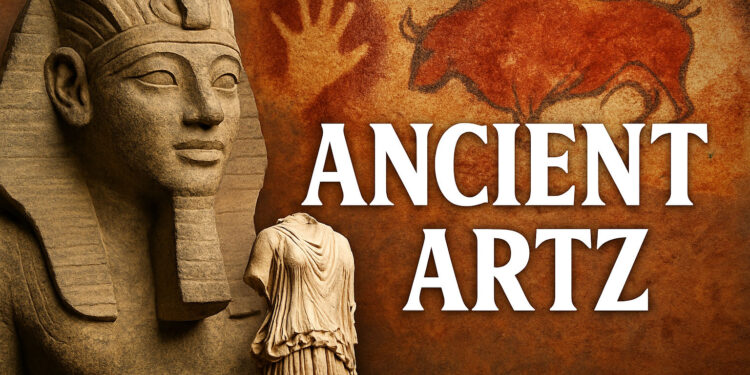From the first handprints smudged on cave walls to the intricate mosaics of Mesopotamia, Ancient Artz are far more than decorative remnants of the past—they are whispers from humanity’s earliest souls. These works weren’t just artistic expressions. They were powerful symbols, sacred tools, and living stories that bound communities together, interpreted the divine, and preserved legacy through time. But what do these artworks really tell us? And why do they still echo so strongly today? Let’s dive deep into the timeless world of Ancient Artz and explore the layers of meaning, spirit, and history buried in every carved stone, painted wall, and fired pot.
The Heartbeat of Humanity
Ancient Artz represents the earliest attempts by humans to document their lives, beliefs, and emotions. Long before written language, early humans turned to symbolism and imagery to communicate with others—and perhaps, even the cosmos. What we often see today in museums or buried beneath ruins were once vibrant tools of culture and consciousness. Every spiral, dot, or animal figure told a story—about survival, ritual, gods, ancestors, or celestial events. These pieces weren’t “just art“—they were the very language of the soul. Understanding ancient art isn’t about admiring beauty alone—it’s about reconnecting with how we once made sense of existence itself.
Cave Paintings
Some of the oldest known pieces of Ancient Artz come from Paleolithic cave paintings found across Europe, Asia, and even Africa. The Lascaux Caves in France, estimated to be over 17,000 years old, showcase detailed renderings of bulls, deer, and human figures. What makes them extraordinary is their precision and purpose. These images weren’t mere doodles they were spiritual projections.
Many researchers believe these paintings held ritualistic meaning, potentially serving as prayers for a successful hunt or as a bridge to the spiritual world. In a time without written words, art was action. Creating these images meant invoking their power. That bull on the wall wasn’t just a memory it was a living presence, brought forth with pigment, breath, and intention.
The Rise of Symbolism
As civilizations began to form, so did more complex symbols. The art of Sumer, Egypt, and the Indus Valley reveals an evolution: from literal representation to abstract iconography. In Mesopotamia, cylinder seals bore detailed etchings used not just for identification but as signatures of power, trade, and narrative. In Egypt, hieroglyphics blurred the line between word and image—each character a piece of Ancient Artz in its own right. A single symbol could carry multiple meanings: spiritual, phonetic, or magical. A falcon might represent the god Horus, kingship, and the sky—all at once. Symbolism wasn’t a separate language from daily life. It was life. And art was its script.
Art Meets Spirit
Much of Ancient Artz was created for spiritual or ceremonial use. Think of the Greek kouros statues, carefully posed as offerings to gods; or the jade burial suits of Han Dynasty China, believed to guard the soul after death. The use of materials was just as symbolic as the images themselves. Gold represented divine light; jade symbolized immortality; obsidian hinted at protection and the underworld. Take the famous “Mask of Agamemnon” from Mycenaean Greece not only a funerary mask but a statement about power, eternity, and the belief that death was a gateway, not an end. Every brushstroke, chisel mark, or bead placement held intention an artistic spell meant to outlast the body.
Ancient Artz Across Cultures
No two ancient cultures created the same kind of art, but they all shared the urge to express identity, belief, and emotion through it. In the Americas, the Mayans carved elaborate stelae depicting rulers and gods intertwined with glyphic writing. In sub-Saharan Africa, Nok terracotta sculptures emphasized expressive faces and refined proportions that scholars believe signified spiritual roles or ancestral memory. In Japan, the Jōmon period left behind cord-marked pottery simple, yet deeply tied to ritual and community.
Aboriginal Australian art, particularly dot paintings, continues today with roots in Dreamtime stories that predate modern civilizations by millennia. The diversity of Ancient Artz reveals one thing: despite vast distances and differing tools, the need to create, honor, and communicate through art was universal.
The Stories They Tell: Memory, Myth, and Identity
What stories do these ancient pieces tell us today? Some are clear: a victory in battle, the lineage of kings, the divine ancestry of a civilization. Others remain mysterious enigmatic glyphs, half-eroded statues, or symbolic arrangements we may never fully decode. Yet the overarching tale is this: humans have always longed to leave a mark. To say “I was here.” To connect across time. These stories don’t just belong to those civilizations they belong to us all. Because in learning about ancient art, we learn about ourselves—our shared origins, dreams, and fears.
Preservation and Interpretation
The interpretation of Ancient Artz today walks a fine line between scholarship and imagination. While archaeologists provide vital insights using scientific tools, art historians often work with fragments and educated guesses. This duality is both a limitation and a gift. It allows room for storytelling, re-connection, and renewed meaning. We don’t just study ancient art we interact with it. Museums, documentaries, and cultural revivals help bridge the ancient and modern, but so do community practices and oral traditions that still carry ancient techniques and meanings forward.
When Past Meets Present
The influence of Ancient Artz is woven into the fabric of modern creativity. Artists like Pablo Picasso drew inspiration from African tribal masks and Iberian sculptures. Indigenous motifs echo in fashion, architecture, and design. Sacred geometry—seen in Egyptian and Indian art—is now used in modern tattooing, logos, and even city planning. Even movies and video games tap into ancient art styles and mythologies to shape their worlds. Whether it’s Marvel’s Wakandan architecture or Assassin’s Creed’s Egyptian landscapes, Ancient Artz continues to inspire awe and imagination. We don’t just study ancient art—we absorb it, reinterpret it, and keep it alive.
Why Ancient Artz Still Captivate the Soul
There’s something deeply primal about viewing Ancient Artz. Maybe it’s the texture of a chiseled stone, the wear of a hand-painted bowl, or the symmetry of an ancient ziggurat that speaks directly to something buried deep within us. These works transcend language and culture. They tap into the collective human experience—our longing to connect, to be remembered, and to make meaning of mystery. In a world flooded with digital content and fleeting trends, ancient art stands as a reminder of the enduring power of creation. It challenges us to look beyond aesthetics and ask: What story are we leaving behind?
Final Thoughts
Ancient Artz isn’t merely a category of human history—it’s a mirror reflecting who we were, who we are, and perhaps who we could be. These artifacts are more than stone, pigment, or clay. They are symbols of belief, echoes of souls, and the most intimate stories our ancestors dared to tell. And when we pause to truly see them—not just as relics but as voices—we do more than preserve history. We awaken it.
Frequently Asked Questions
1. What exactly qualifies as “Ancient Artz”?
Ancient Artz refers to creative expressions from early human civilizations, often including cave paintings, sculptures, pottery, jewelry, and architectural elements with symbolic or spiritual significance.
2. Why is ancient art important today?
It provides insight into human evolution, belief systems, cultural values, and how early societies made sense of their world. It’s also a foundation for modern artistic expression.
3. Which cultures are most known for their ancient art?
Prominent examples include the Egyptians, Greeks, Romans, Sumerians, Mayans, Chinese, and Aboriginal Australians, among others.
4. What materials were commonly used in Ancient Artz?
Stone, clay, metal, wood, natural pigments, and organic materials like bone or feathers were often used depending on location and era.
5. How is Ancient Artz preserved today?
Through museum collections, archaeological conservation efforts, digital restoration, cultural preservation programs, and ongoing research.
Stay connected for the latest news and updates on Topic News














